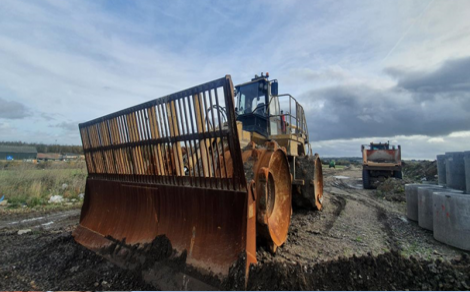Twelve-week transformation gives landfill compactor another life

A team of specialist rebuild engineers at Finning UK & Ireland have taken just 12 weeks to completely transform a 15-year-old Cat landfill compactor for FCC Environment - rebuilding it with a mix of reconditioned and remanufactured parts so it is fit for a second life. H&P reports.
FCC Environment owns and operates over 200 recycling, treatment, and disposal facilities across the UK, managing more than 8.5 million tonnes of waste for their customers, which include some 72 local authorities across North Yorkshire, Suffolk and Essex.
Landfill sites are harsh environments with typically rough and contaminated land surfaces. Machines operating in these conditions therefore must be extremely hardy and robust. So, imagine the state of the machine when it rolled into the Finning service workshop after 15 years of unforgiving hard work.
FCC’s current waste processing fleet alone comprises 500 machines including landfill compactors, wheeled excavators, track type loaders and articulated dump trucks, with Cat equipment making up almost half. It bought the Cat 836 landfill compactor from Finning in 2007 with a full repair and maintenance programme, which kept the machine operational with a minimal amount of downtime.
The transmission on the machine failed at the end of 2022. Working in collaboration with FCC Group Plant Manager, Bill Stone, the Finning team was able to consider the best solution that would meet FCCs needs and included looking at buying a brand-new replacement machine, or have the existing machine completely refurbished to the highest specification available with a Cat certified machine rebuild: “As a company operating in the waste and recycling sector, we understand how important it is to embrace sustainable approaches across all aspects of our business and have transformed our operations accordingly to limit our company-wide environmental impact.
“While sustainability played a big role in our decision, we also needed to weigh up the time it would take and how much it would cost. The lead time for a replacement machine, for example, was longer than the estimated three month rebuild turnaround. Crucially it was Finning providing reassurance on the quality and performance of the machine that was the tipping point, so we commissioned them to carry out the rebuild.” Each rebuild project has a dedicated team of engineers. This one was led by Ben Marston with Thomas Raybould who worked with other engineers throughout the 12 weeks on every aspect of the machine rebuild"
Each rebuild project has a dedicated team of engineers. This one was led by Ben Marston with Thomas Raybould who worked with other engineers throughout the 12 weeks on every aspect of the machine rebuild
The first task that the engineers undertook was to fully disassemble the machine piece by piece. This involved draining off the oils and fluids from all major components, disconnecting them, and removing the axles so the engine, torque convertor and pumps could be taken out in one go. Then the transmission, fuel tank and steering cylinders were removed ready for the engineers to wash down and carry out a detailed inspection of the machine and cab to identify the full scope of work required to get the machine back to as new condition.
-
PPMA 2025
23 September, 2025, 9:30 - 25 September, 2025, 16:00
NEC, Birmingham UK -
Advanced Engineering Show 2025
29 October, 2025, 9:00 - 30 October, 2025, 16:00
NEC, Birmingham UK










